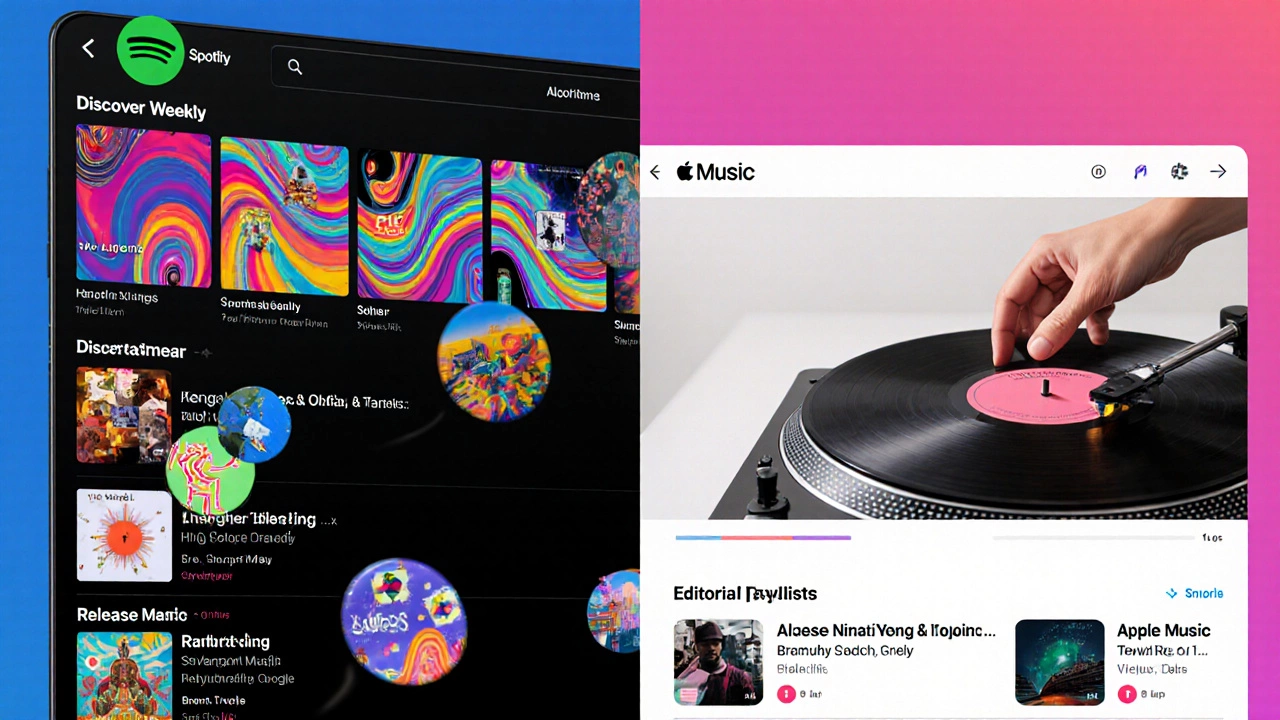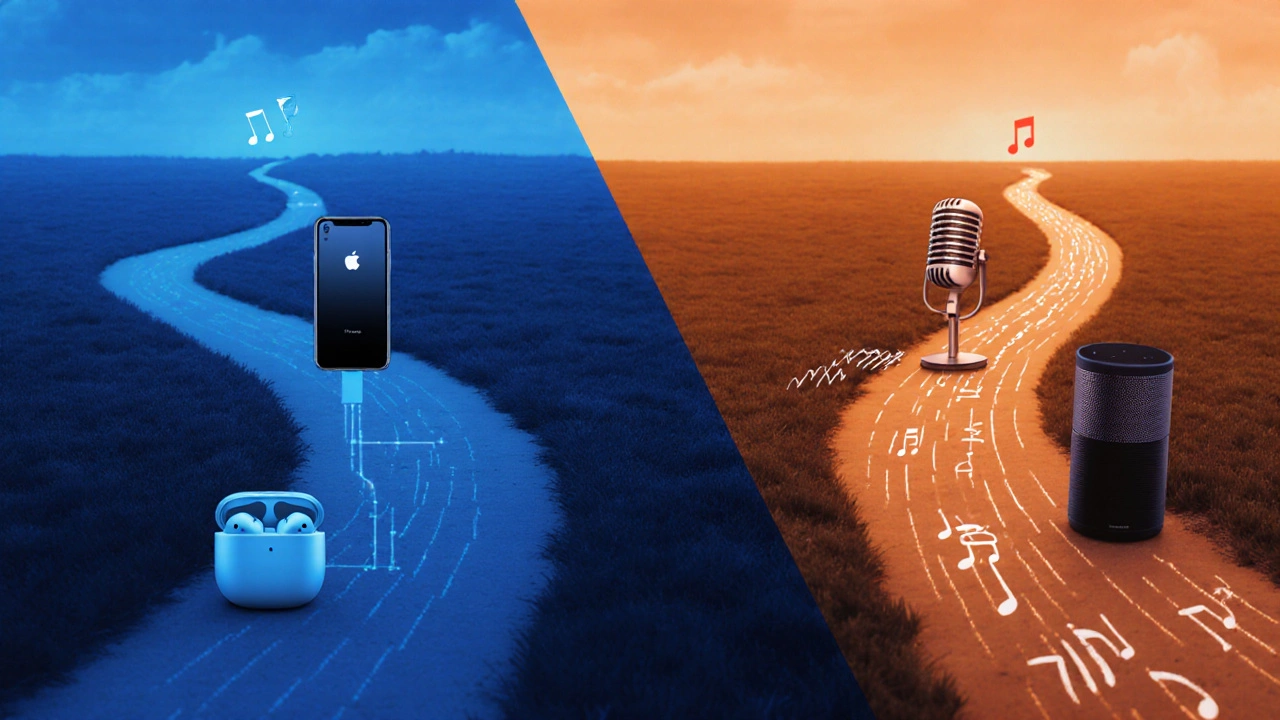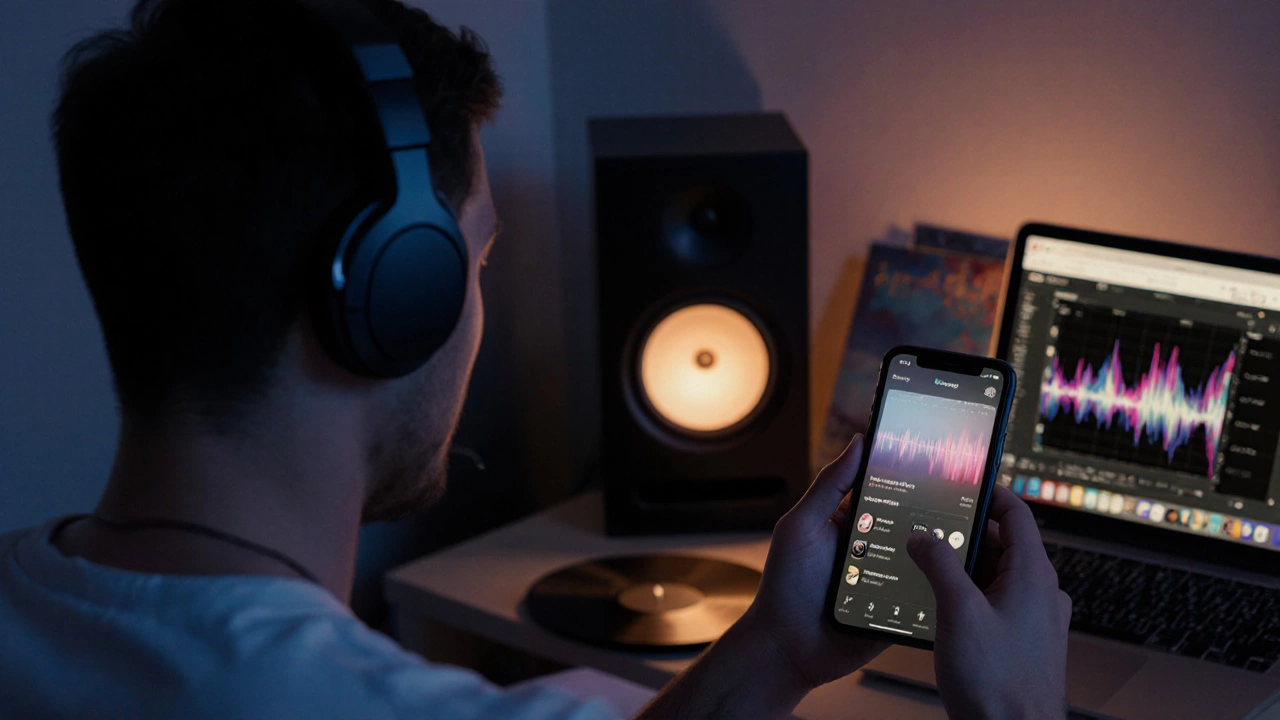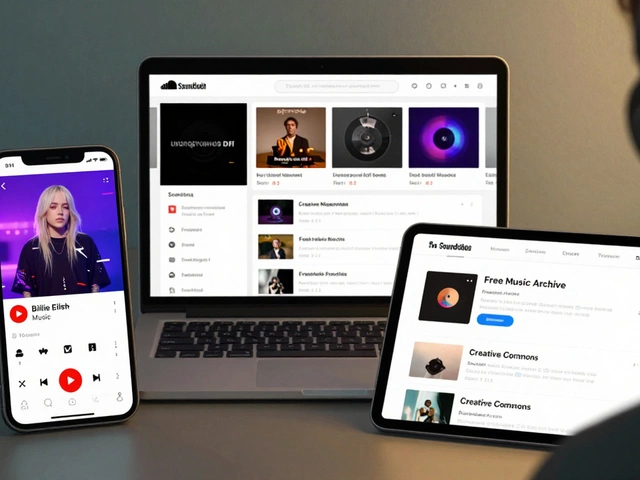Spotify vs Apple Music: Which Is Right For You?
Find your perfect match based on your priorities. This tool analyzes your preferences against key differences from the article.
Answer 5 quick questions to discover which service aligns best with your needs.
1. What's your primary device ecosystem?
2. How important is sound quality to you?
3. How often do you listen to podcasts?
4. What's your budget priority?
5. What's most important for music discovery?
Spotify and Apple Music both claim to be the best music streaming service. But if you’re trying to pick one in 2025, you’re not just choosing a playlist tool-you’re picking a whole ecosystem. One gives you more songs. The other gives you better sound. One works better with your phone. The other works better with your car. So which one actually wins? It depends on what you care about.
Library Size: Spotify Has More, But Apple Music Isn’t Far Behind
Spotify claims over 100 million tracks. Apple Music says it has over 100 million too. On paper, they’re tied. But here’s what most people don’t realize: Spotify has more independent artists, podcasts, and niche genres. If you listen to underground hip-hop from Lagos, experimental jazz from Tokyo, or indie folk from rural Finland, Spotify’s algorithm is more likely to surface it. Apple Music leans toward major labels. It’s got the big names-Taylor Swift, Drake, Beyoncé-perfectly covered. But if you’re hunting for something obscure, Spotify’s library feels wider.
Apple Music made up ground fast by signing exclusive deals with artists like Frank Ocean and Radiohead back in 2015. Today, almost everything is available on both. The difference isn’t in quantity. It’s in curation. Apple Music’s editorial team still hand-picks playlists like Today’s Top Hits and New Music Daily with more care than Spotify’s algorithm-driven picks. If you like human-curated discovery, Apple Music feels more thoughtful.
Sound Quality: Apple Music Wins for Audiophiles
If you care about how music actually sounds, Apple Music has a clear edge. It offers lossless audio at up to 24-bit/192 kHz and spatial audio with Dolby Atmos-all included in the standard $10.99 monthly plan. You don’t need to pay extra. Spotify, on the other hand, only offers lossless audio (up to 16-bit/44.1 kHz) on its $16.99 Premium plan. That’s a $6 jump just to get CD-quality sound. And even then, Spotify doesn’t offer Dolby Atmos spatial audio.
On a good pair of headphones or a high-end speaker, the difference matters. Apple Music’s lossless tracks sound fuller, especially in the low end. Strings and vocals have more presence. Spotify’s streaming quality, even at its highest, still feels a little compressed. If you’ve ever listened to a vinyl rip or a studio master and wondered why your streaming service sounds flat, Apple Music is the fix.
Integration: Apple Music Fits Better in the Apple Ecosystem
If you own an iPhone, AirPods, Apple Watch, or HomePod, Apple Music is the obvious choice. It integrates seamlessly. Play a song on your phone, and it instantly switches to your HomePod when you walk into the kitchen. Siri can play your favorite album just by voice. Your playlists sync across every Apple device without a glitch.
Spotify works fine on Apple devices, but it’s always playing catch-up. The app feels like a third-party guest in Apple’s house. Notifications don’t sync as cleanly. Siri can’t control Spotify as naturally. The Apple Watch app still lags behind Apple Music’s in responsiveness. And if you use Apple CarPlay? Apple Music loads faster, remembers your last playlist, and doesn’t crash as often.
But if you’re on Android, or you use a Roku, a Sonos speaker, or a Google Nest, Spotify is more reliable. It’s got wider hardware support. Apple Music still doesn’t work on some smart TVs or older Bluetooth speakers. Spotify just… works.

Discovery and Personalization: Spotify’s Algorithm Is Scary Good
Spotify’s secret weapon is its algorithm. Every Monday, millions of people get Discover Weekly and Release Radar. These playlists feel like they were made just for you. They mix old favorites with new songs you’ve never heard but instantly like. The algorithm learns your habits-how long you listen, when you skip, what time of day you play chill tracks-and adjusts in real time.
Apple Music tries to copy this with For You and Apple Music Replay, but it’s not as precise. It’s more about trends than personal taste. You’ll see the same top 10 songs everyone else is listening to. Spotify’s recommendations feel like a friend who knows your mood. Apple Music’s feel like a radio station.
Spotify also has better social features. You can see what your friends are listening to, share playlists in real time, and even collaborate on them. Apple Music lets you follow friends, but sharing feels clunky. It’s not built for community.
Price and Plans: Both Are Similar, But Spotify Has More Options
Both services charge $10.99 for individual plans. Student plans are $5.99. Family plans (up to six people) are $16.99 on both. So far, it’s a tie.
But Spotify has a free tier. Yes, it’s ad-supported. Yes, you can’t skip more than six songs an hour. But it’s there. You can use Spotify for free forever. Apple Music has no free option. You need to start a trial, then pay.
Spotify also offers a Duo plan ($14.99) for two people living together-something Apple Music doesn’t have. And if you’re a college student, Spotify’s verification process is simpler. Apple Music requires you to use a .edu email or verify through UNiDAYS, which can be a hassle.
Podcasts and Audio Content: Spotify Is the Clear Winner
Apple Music is a music service. Spotify is a music and audio service. Big difference.
Spotify bought podcast companies like Gimlet and Anchor. It signed exclusive deals with Joe Rogan, Lex Fridman, and Michelle Obama. Now, over 5 million podcasts live on Spotify. You can find true crime, comedy, news, and self-help without leaving the app. Apple Music has podcasts too-but only the ones Apple already had from iTunes. The selection is smaller, and discovery is worse.
If you listen to podcasts more than once a week, Spotify is the only choice. Apple Music doesn’t even try to compete here.

Who Should Switch? Who Should Stay?
Switch to Apple Music if:
- You own Apple devices and want everything to work perfectly together
- You care about sound quality and want lossless and spatial audio without paying extra
- You prefer human-curated playlists over algorithm-driven ones
Stay with Spotify if:
- You want a free tier to test things out
- You listen to podcasts regularly
- You want the most personalized discovery and social features
- You use Android, Sonos, or non-Apple speakers
Here’s the truth: neither service is perfect. Apple Music sounds better. Spotify understands you better. If you’re on the fence, try both for a month. Use Apple Music for a week with your AirPods. Use Spotify for a week with your Android phone. See which one feels like it’s yours.
Final Verdict: It’s Not About Better. It’s About Yours.
There’s no single winner. Apple Music wins on sound and integration. Spotify wins on discovery, podcasts, and freedom. If you’re deep into Apple’s world, Apple Music is the natural home. If you’re a music explorer who wants to find hidden gems, Spotify is your compass.
Most people stick with what they’ve always used. But if you’re ready to switch, don’t just pick the one with more songs. Pick the one that feels like it gets you.
Is Spotify or Apple Music cheaper?
Both charge $10.99 per month for individual plans and $16.99 for family plans. But Spotify offers a free tier with ads, while Apple Music requires a paid subscription from day one. Spotify also has a Duo plan for two people at $14.99, which Apple doesn’t offer.
Does Apple Music have better sound quality?
Yes. Apple Music offers lossless audio up to 24-bit/192 kHz and Dolby Atmos spatial audio at no extra cost. Spotify only offers lossless at 16-bit/44.1 kHz, and only on its $16.99 Premium plan. Apple Music’s sound is noticeably richer, especially on high-end speakers or headphones.
Can I use Spotify on an iPhone?
Yes, Spotify works fine on iPhone. But it doesn’t integrate as smoothly as Apple Music. Siri can’t control Spotify as naturally, notifications sync less reliably, and the app sometimes lags when switching between devices. Apple Music feels like it was built for iOS.
Which app has better recommendations?
Spotify. Its algorithms like Discover Weekly and Release Radar learn your habits and suggest songs you haven’t heard but will love. Apple Music’s recommendations are more general and based on popular trends. Spotify feels personal. Apple Music feels like a radio station.
Does Apple Music have podcasts?
Yes, but not many. Apple Music includes podcasts from iTunes, but it doesn’t have the same depth as Spotify. Spotify has over 5 million podcasts, including exclusive shows from Joe Rogan and Michelle Obama. If you listen to podcasts regularly, Apple Music isn’t the right choice.
Next Steps: Try Both Before You Decide
Don’t just read reviews. Test them yourself. Start a free trial of Apple Music (one month). Use it for a week with your AirPods and HomePod. Then switch to Spotify’s free tier for a week. Notice how each app feels when you’re commuting, working out, or relaxing at home.
The best service isn’t the one with the most features. It’s the one you forget you’re using-because it just works the way you want it to.







